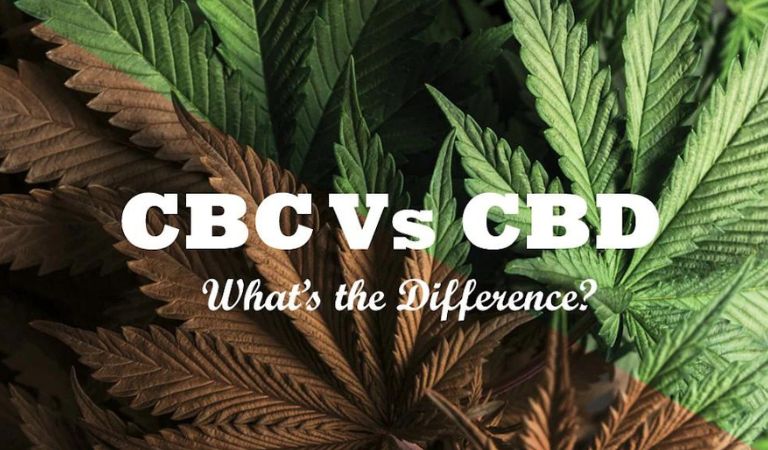CBD VS CBC: Understanding The Difference Between Them

If you are a big fan of CBD products and have been using them for quite a while, you might have also heard about other prominent cannabinoid compounds.
THC, CBC, CBG, CBN, and so on.
And you might have also compared these compounds’ advantages to that of CBD, haven’t you?
And this is why you’ve been clicking on links-after-links to get an answer to the one big question.
What’s the difference between CBC and CBD?
Luckily, we’re about to state the difference between CBD and CBD in this article.
For your better understanding, let’s begin by comparing CBD and CBC.
Shall we?
CBD: What Is Hype All About?
CBD is no news for you.
It’s been around the market for quite a while now, and after the US Farm Bill 2018, it seems like CBD is not only for online stores. Instead, gas stations and big convenience stores also sell CBD products today.
Given that CBD is the most abundant cannabinoid compound in the Cannabis sativa plant, it’s hardly surprising that its popularity has soared.
And the cherry on top? It is non-intoxicating and, therefore, used in tinctures, oils, capsules, lotions, balms, and creams to get the maximum benefits.
CBD: How Does It Work?
Since CBD is a non-psychoactive compound, it is an antagonist to the body’s ECS system by blocking THC activity and its “high” effects.
When CBD gets into the bloodstream, it immediately binds with CB1 and CB2 receptors in the brain and immune cells and regulates the body’s natural functions.
Hence, it attracts the highest interest among individuals seeking pain and inflammation relief without the need to experience the sensation of being high.
CBD: Exploring The Benefits
When CBD entered the market after getting the green light, it quickly gained attention due to its purported health benefits.
Several studies have come forward stating CBD’s influential role in treating
- Insomnia: Research suggests CBD has pain-relieving and mood-altering effects that can assist individuals struggling with sleep difficulties.
- Epilepsy: A recent study suggested that CBD might effectively manage epilepsy symptoms, particularly Dravet syndrome.
- Stress and Anxiety: One research found that CBD use might also help manage anxiety and stress for individuals dealing with frequent episodes of heightened anxiety.
Side Effects of CBD: What Are They?
There are minimal side effects reported with CBD use in individuals, and any that occurred were due to individual allergies.
But, it’s worth knowing that CBD may induce some reactions in people after prolonged use. These include:
- Drowsiness
- Diarrhea
- Fatigue
- Nausea
- Dry mouth
- Decreased appetite
- Mood changes
Understanding CBC: All You Need To Know
Cannabichromene, commonly known as CBC, comes from the same source as CBD and THC, i.e., the Cannabis sativa plant.
However, given the potential health benefits of CBC, it’s unfortunate that it does not receive as much attention as CBD or THC. While the US Farm Bill 2018 worked in favor of CBD and got it the biggest market deal in many industries, be it food, pharmaceutical, or skincare, CBN and CBC also made strides, yet they haven’t achieved the same level of popularity.
But that does not mean the demand for CBD products is any less in the market. When in reality, it’s the opposite.
CBC: How Does It Work?
Much like CBD, CBC is a non-intoxicating compound that binds with the endocannabinoid receptors in the body when it is consumed.
However, the ECS-CBC interaction is slightly different than that of ECS-CBD.
While CBD binds with the CB1 and CB2 (partial infinity) receptors in the brain and regulates physiological functions, CBC does not work the same.
Instead, it strongly binds with the receptors in different body parts responsible for perceiving pain, such as TRPA1 and TRPV1.
When consumed, CBC quickly enters the bloodstream and binds with the mentioned receptors, producing endocannabinoids such as Anandamide, evoking an entourage effect and making the consumer feel relaxed and pain-free.
CBC: What Are Its Potential Health Benefits?
Given that CBC is also a non-psychoactive compound, it gets welcomed warmly in many industries all at once much like CBD.
Additionally, CBC has demonstrated itself as one of the most efficacious cannabinoid compounds for medicinal applications.
Regarding medical applications, recent studies suggest that CBC has anti-inflammatory, anti-viral, and analgesic properties that help manage several conditions, including swelling, reducing pain, and managing stress.
Moreover, several research studies claim that CBC also helps in conditions such as:
- Cancer: As evidence suggests, CBC has anti-cancer properties and works by inhibiting the growth of cancerous cells in the body.
- Depression and Anxiety: CBC has had promising effects on treating depression and anxiety. It seems to work positively with our body’s natural endocannabinoid system, which has a good effect on how we regulate our moods and handle stress.
- Neurological disorders and Migraines: Evidence suggests that CBC is effective in treating migraines, brain trauma injuries, multiple sclerosis (MS), Alzheimer’s disease, and Parkinson’s disease.
- Acne: CBC helps manage acne by suppressing the excessive oil production from the sebaceous glands, helping breakouts and skin texture to clear.
Read Health Benefits Of CBD Capsules 1500mg
CBC: What Are Its Side Effects?
Given that there has been little research conducted on CBC use and its benefits, there aren’t many studies suggesting the potential side effects of CBC use.
However, since CBD and CBC share similarities, it’s reasonable to assume that the side effects linked to CBD would also likely apply to CBC.
Similarities Between CBD & CBC: Are There Any?
After reading about both cannabinoid compounds, it’s reasonable to inquire about their similarities.
- CBD and CBC come from the cannabis sativa plant and are the most abundant, naturally occurring cannabinoid compounds.
- CBD and CBD are non-intoxicating compounds, unlike THC, and do not give high sensation to their users.
- Several health benefits offered by CBC and CBD are the same, including pain relief, anti-inflammation effects, antidepressant properties, and mood-altering qualities.
CBD VS CBC: What Are The Differences?
There are a few differences between CBD and CBC down, such as:
- While CBD is derived from the flower of the Cannabis sativa plant, CBC is extracted from its stem.
- There is a structural difference between CBD and CBC. While CBD has two hydroxyl (-OH) groups, CBC has only one.
- CBC binds with CB1 and CB2 receptors, unlike CBD, which also binds with CB1 and CB2 receptors. However, CBD demonstrates partial infinity with CB2. This makes CBC a stronger candidate for possessing anti-inflammatory effects than CBD.
- CBC exerts anti-inflammatory effects by engaging with TRPA1 and TRPV1 receptors, while CBD has a similar impact interacting with 5-HT1A receptors.
Final Thoughts
It’s worth understanding that every cannabinoid compound has its unique qualities; some effects produced by one may not be replicated in the same way by another.
However, the therapeutic benefits offered by CBD and CBC are closely related. And yet, the differences between the two draw a line, highlighting the fact that the cannabis plant has numerous cannabinoid compounds that are more or less the same and yet uniquely distinct from one another.
With that said, the benefits provided by both compounds appear to highlight their potential for medicinal use in treating various conditions. However, much research is needed to substantiate the health benefits they offer.
